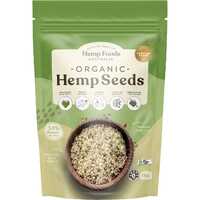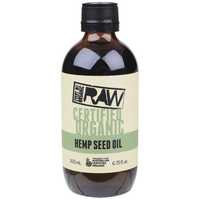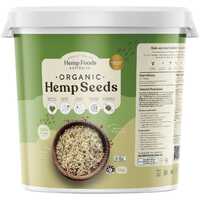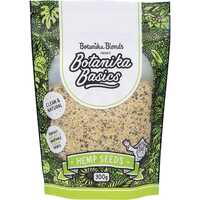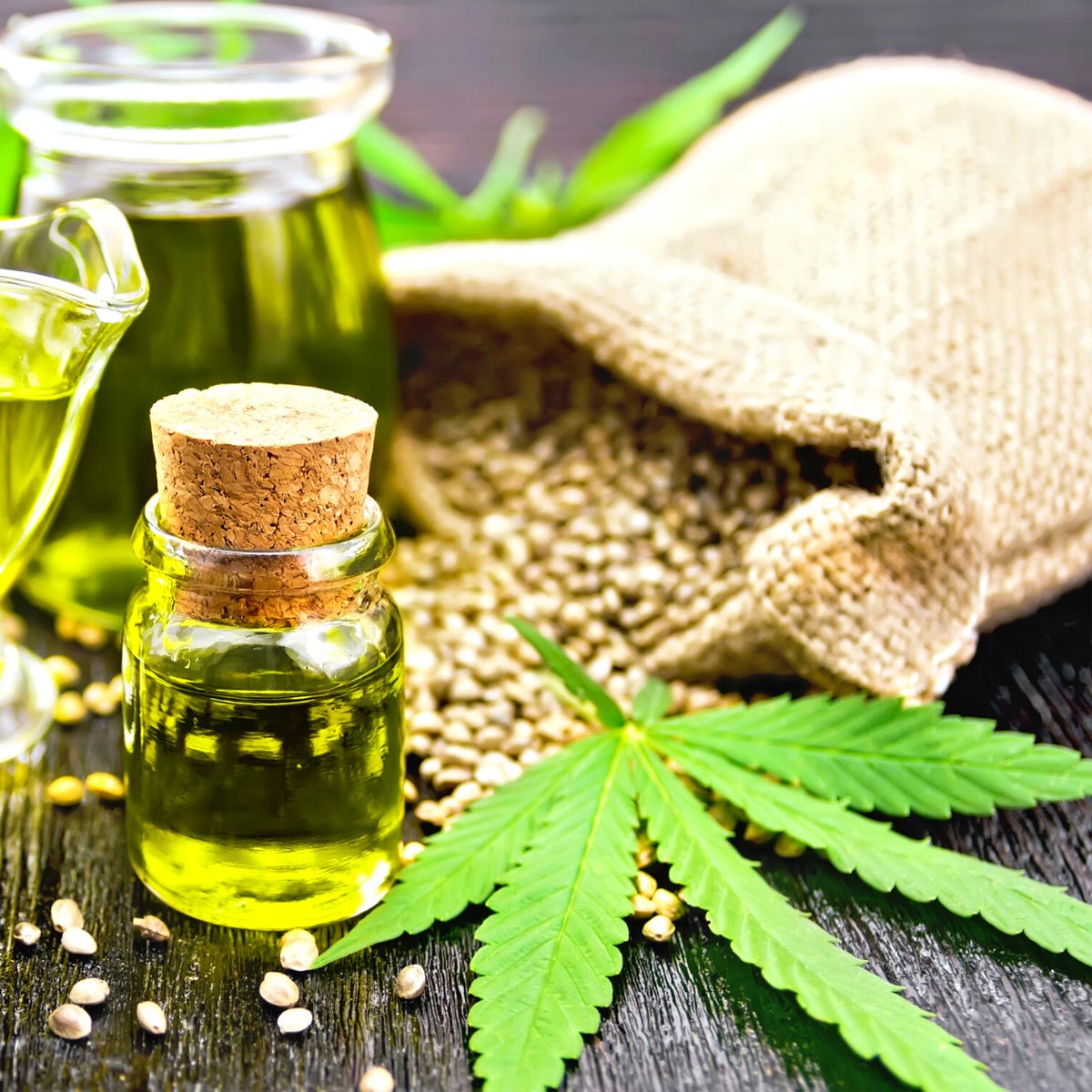Hemp is a variety of the Cannabis sativa plant that's specifically grown for medicinal, nutritional, and industrial purposes. This versatile and fast-growing plant has been used around the world for thousands of years – it is a great resource for paper, rope, textiles, plastics, biofuel, medicine, and food products.
Hemp is a popular modern superfood, with the oils, seeds, and flour of this plant providing a range of nutritional benefits. While hemp lacks the mind-altering effects of other cannabis varieties, it can have a profound effect on all aspects of your health and wellbeing.
What is Hemp?
Food-grade hemp is a special strain of cannabis bred with minimal levels of the psychoactive compound tetrahydrocannabinol (THC). Like all cannabis, it is a flowering dioecious plant with male and female variants.
Hemp has served multiple purposes across diverse human civilizations, from fuel and livestock to clothing and medicine. All parts of the hemp plant have proved useful, with fibre coming from the stems, protein from the seeds, and oils from the seeds, leaves, and flowers.
- As an industrial product, hemp is grown for its fibre content, which is produced primarily from the stems.
- As a medicinal product, hemp is available as an oil that's rich in cannabidiol (CBD) and other therapeutic cannabinoids.
- As a food product, hemp can be consumed as raw seeds, processed oils, or refined seeds, flowers, and leaves.
The Nutritional Profile of Hemp
Hemp offers wide-ranging health benefits – its rich and diverse nutrient profile is matched by few other products. Roughly 49% of all hemp seed is an edible oil, including 76% polyunsaturated fat content. Hemp includes omega-6 fatty acids and omega-3 fatty acids at an optimal 3:1 ratio. These essential fats are highly beneficial to many aspects of human health.
Hemp seeds contain lots of healthy fats, fibre to help with digestion, and all essential amino acids. It is also a great source of magnesium and numerous other vitamins and minerals. The following components make hemp-based foods a valuable addition to any balanced diet:
- Healthy balanced fats – Perfect 3:1 ratio of omega-6 and omega-3 fats
- Plant-based protein – One of very few complete plant-based protein sources
- Fibre content – Helps with weight management, gut health, and blood sugar stability
- Wholefood goodness – Contains vitamin E, magnesium, phosphorus, potassium, iron, zinc, B vitamins, and more
The Many Types of Food-Grade Hemp
Many parts of the hemp plant can be used to produce food, including seeds, flowers, and leaves. Hemp seeds are the richest and most beneficial from a nutritional perspective. Seeds are available in their pure form and also refined as oil and flour products.
Hemp seeds can be easily separated into hemp oil and hemp flour, with the latter often sold as protein powder after the fat content has been removed. Hemp flour can also be made from the plant's flowers and leaves for a less nutrient-rich product.
Different parts of the hemp plant have proved useful for different applications, with the following three food categories widely available and uniquely beneficial:
Hemp Seeds
Hemp seeds, which are technically a nut, are sold as a wholefood product due to their rich and balanced profile. While refined hemp powder products provide beneficial proteins, vitamins, and minerals without the high fat content, unprocessed hemp seeds offer the complete package.
Whole hemp seeds are often separated and refined as hemp seed oil, hemp milk, hemp cheese, and hemp powder.
Hemp Oil
Hemp oil includes medicinal CBD oil rich in cannabinoids and food-grade hemp oil rich in healthy fats, protein, vitamins, and minerals. While hemp CBD oil is made from the plant's flowers and leaves, food-grade hemp oil is made primarily from hemp seeds.
Hemp seed oil is a great addition to many other food products and is responsible for many of the plant's benefits.
Hemp Powder
Also known as hemp flour or protein powder, hemp powder allows you to ingest hemp without the high fat content. While hemp seeds and hemp seed oil also contain protein, extracting the flour from the seeds makes it easier to consume higher amounts of protein when you don't want the fat content.
Health Benefits of Hemp
Due to its rich and balanced nutrient profile, hemp has been associated with the following health benefits:
Heart Health
Hemp helps to promote a strong and healthy heart. The omega-3 fatty acids in hemp help to reduce the risk of arrhythmias and heart disease. Hemp seeds also contain high levels of magnesium and arginine – an amino acid that turns into nitric oxide to keep the blood vessel walls smooth and elastic. While a good heart is dependent on regular exercise and healthy dietary habits, the consumption of hemp foods may help to promote heart health.
Skin Health
Hemp may prove beneficial for the health and appearance of the skin, with fatty acids and other compounds helping to reduce inflammation and the effects of skin diseases. Omega-3 and omega-6 fats have been found to improve symptoms associated with a range of skin conditions, including acne, eczema, and psoriasis, among others. Hemp oil may help contribute to stronger and more elastic skin due to its resistance to viral, bacterial, and fungal infections.
Reduced Inflammation
Hemp food products help to reduce inflammation, and, once again, it's thanks to the high fat content. In the right combination, some healthy fats have anti-inflammatory effects similar to drugs like ibuprofen. Hemp seeds are a rich source of gamma linolenic acid (GLA), which is an omega-6 fatty acid known to reduce arthritis-associated pain.
Chronic inflammation is a marker in many known diseases, including heart disease, diabetes, and arthritis. When combined with a healthy diet and regular exercise habits, hemp consumption can help to promote an environment of reduced inflammation.
Energy and Healing
Many of the benefits of hemp can be attributed to its strong nutrient profile. While hemp and other superfood products do not fight specific symptoms or diseases, they do help to promote a well-balanced environment inside your body. When you have access to the right nutrients in your diet, your body is better equipped to fight off invaders and manage problems. While hemp is not a magic cure, it is a legit superfood with an incredibly rich nutrient profile for maximum energy and healing.
How to Incorporate Hemp Into Your Diet
There are lots of ways to incorporate hemp products into your daily diet. In fact, one of the best things about hemp and other superfoods is how efficient they can be. Instead of ingesting lots of meat, bucket loads of salad, or countless expensive supplements, you can easily add hemp seeds, oils, and powders to your regular diet. When it comes to hemp, a little goes a very long way, both in terms of nutrition and taste.
Hemp seeds are a great snack by themselves and are fantastic on salads, pastas, and cereals. While hemp seed oil can be used for cooking, it may destroy many of the valuable fatty acids. Instead, try putting it on salads, pastas, or home-made dips.
Hemp powder is great with shakes and cereals, and it is ideal for baking breads and cakes if you get some good recipes. Hemp is also amazing when added to things like peanut butter and coconut oil. And, it is widely available as a supplement for easy consumption at any time.
At Healthy Being, we believe in the power of hemp, so if you're looking for a huge range of healthy and delicious hemp products, check out a premium range and get a jump start on supercharging your health!


 Certified Organic
Certified Organic Vegan Friendly
Vegan Friendly  Vegetarian
Vegetarian Organic Ingredients
Organic Ingredients Dairy Free
Dairy Free Gluten Free
Gluten Free Keto Friendly
Keto Friendly


























